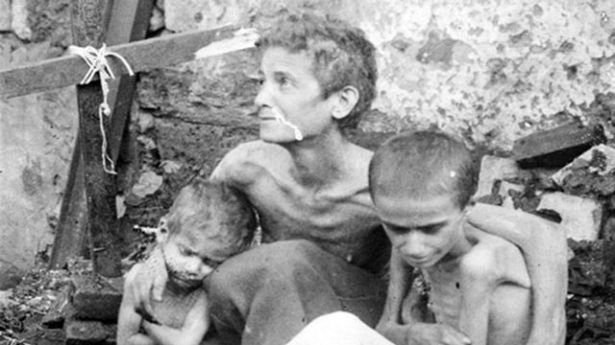
Previously we left Daniel dealing with his master’s greediness
FROM DANIEL’S DIARY
53 – Starving deportees on the sidewalks of Aintab
The famine in Turkey 1916-1917 was bad. Probably the crop was poor but also the army took whatever was produced and a lot of wheat and other food was being shipped to Germany where they had a great food shortage.
When the Ottoman army and the Turkish population did not have enough food, naturally the Armenian deportees would be allowed to starve. They were to live on crumbs but now there weren’t even any crumbs.
On the sidewalks of Aintab the deportees were lying on the floor begging for food. They had no strength to walk or even stand. Stretched on the sidewalk, they would begg for food from the passers-by day after day and every day their voices getting weaker until they died. There was a tall and handsome boy not more than 15 years old who died on our street not far from the bakery. This has left upon my mind a lasting feeling of guilt. It is true that I was forbidden to give out bread, that precious material which we alone seemed to have plenty of, but I suppose I could have given him in secret.
If I was only a lad of seven and under threat of dismissal and starvation; what about the hundreds of adults who passed by that young man daily? Nobody seemed to care for the helpless and the starving.
54 – How I learned Turkish or “ next to the worse people”
Curses, blasphemy, course language and theft were the rule among the workers of the bakery. It was known in Aintab that tannery workers were the worst people, the scum of the town. The bakery workers were proud to say that, next to the tanners, they were the worst people.
By 1916 I had picked up some Turkish but my real education in Turkish was in the bakery. Thus I picked up the worst curses, blasphemy and the coarsest form of Turkish in use in Aintab.
In later life I got over this early “education” because at the time I was too young to really grasp the true meaning of the words I heard daily, sexually I was immature. Also, for many years (1918-1940) I had other teachers of Turkish, these were the Armenian Protestant pastors whose sermons in Turkish and conversation now constituted a permanent part of my environment.
 Daniel said that nobody seemed to care for the helpless and starving in the city of Aintab. People begged and were allowed to die of hunger on the street. Our relationship with beggars has always fascinated me. Growing up in Lebanon, beggars were and are still a part of the scenery. When I used to live in Lebanon, my daily journey to work by car included stopping at several junctions. It felt as if the beggars had reserved their spaces at each of these junctions. I wondered if they had an understanding with each other on reserving their spots. Some of them were as young as seven years old, selling packets of chewing gum, others were very old, some were mentally or physically challenged and there was always the mom carrying a sleeping baby or toddler and of course the ubiquitous blind man. As I approached a junction, I would wonder if the beggar limped like he did yesterday or if he was faking it and was the blind man’s half closed eyes the same or not? Do most drivers, stuck in traffic, have a ‘relationship’ with beggars or is it just me and my imagination going wild? My generosity depended on my mood and mainly how my day ended in the office. If I was calm and serene, I would observe the beggars from a distance, go through my wallet to see how much change I had and then decide to give money to beggar 1, 2 and 3, and then I’d say to myself; tomorrow I’ll give money to beggars 4,5 and 6. I would ask myself what their story was, why were they on the streets and not in a job? Some days, I would see a beggar looking straight at me as the traffic started moving and I would be on the phone arguing with a client or a supplier and instinctively, I would accelerate so I wouldn’t come face to face with him or her. If I was in a bad mood after a long day at the office, I would look the other way thinking, ‘why can’t he get a job, begging is not the answer – it’s easy money’. I saw the same beggars almost everyday but when they weren’t there for a few days, I would notice their absence and wonder if anything bad had happened to them. Looking back, I feel a bit stupid playing these mind games with the beggars. What is it with us humans? Kindness and generosity seem to be qualities measured by our mood on that day? That thought scares me – but it’s true.
Daniel said that nobody seemed to care for the helpless and starving in the city of Aintab. People begged and were allowed to die of hunger on the street. Our relationship with beggars has always fascinated me. Growing up in Lebanon, beggars were and are still a part of the scenery. When I used to live in Lebanon, my daily journey to work by car included stopping at several junctions. It felt as if the beggars had reserved their spaces at each of these junctions. I wondered if they had an understanding with each other on reserving their spots. Some of them were as young as seven years old, selling packets of chewing gum, others were very old, some were mentally or physically challenged and there was always the mom carrying a sleeping baby or toddler and of course the ubiquitous blind man. As I approached a junction, I would wonder if the beggar limped like he did yesterday or if he was faking it and was the blind man’s half closed eyes the same or not? Do most drivers, stuck in traffic, have a ‘relationship’ with beggars or is it just me and my imagination going wild? My generosity depended on my mood and mainly how my day ended in the office. If I was calm and serene, I would observe the beggars from a distance, go through my wallet to see how much change I had and then decide to give money to beggar 1, 2 and 3, and then I’d say to myself; tomorrow I’ll give money to beggars 4,5 and 6. I would ask myself what their story was, why were they on the streets and not in a job? Some days, I would see a beggar looking straight at me as the traffic started moving and I would be on the phone arguing with a client or a supplier and instinctively, I would accelerate so I wouldn’t come face to face with him or her. If I was in a bad mood after a long day at the office, I would look the other way thinking, ‘why can’t he get a job, begging is not the answer – it’s easy money’. I saw the same beggars almost everyday but when they weren’t there for a few days, I would notice their absence and wonder if anything bad had happened to them. Looking back, I feel a bit stupid playing these mind games with the beggars. What is it with us humans? Kindness and generosity seem to be qualities measured by our mood on that day? That thought scares me – but it’s true.
FROM DANIEL’S DIARY
55 – Why so much confidence in me ?
My master had great confidence in me. He would not trust anybody even his own son as he would trust me. There were several reasons for this.
First, I was a little child of 7, not used to having money and not even aware of the power of money.
Second, I had no contacts in town except the family of my master. All day I was working and getting just a few hours of sleep at night. Even if I stole his money, which I could do very easily, I would have no place to keep it, no way to spend it and no person to give it to.
Third, he realized that in my early childhood I had been conditioned against any form of theft.
Knowing all these he would trust the key of the shop only to me. Outside the family I was the only one who could cash money from sales, under circumstances where no checks of any kind existed or were possible, and I was the only one who would sit every evening around a pile of coins and help sort it out.
To be continued..
Menak Parov..See you next Wednesday



0 Comments